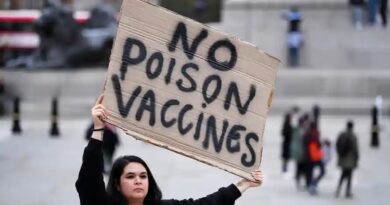Coronavirus could turn into a seasonal virus, but it will keep spreading until the population achieves herd immunity, say experts

Big Pharma is pushing for mandatory coronavirus (COVID-19) vaccination even though no one has come forward with a drug that’s 100 percent safe for use. Yet according to a study, a vaccine won’t even be necessary once the population achieves herd immunity and COVID-19 turns into a seasonal illness like the flu.
Learn to live with coronavirus, advise researchers
A review published in the journal Frontiers in Public Health suggests that, in time, COVID-19 may turn into a seasonal illness like the flu. However, the researchers said that this will only be possible once the population achieves herd immunity. But what exactly is herd immunity?
According to the Centers for Disease Control and Prevention (CDC), herd immunity, or community immunity, is a situation in which a sufficient proportion of a population is immune to an infectious disease (through vaccination and/or prior illness), making its spread from person to person unlikely.
This means that in an area where the population has achieved herd immunity, fewer people get sick, and fewer germs spread from person to person. Even newborn babies and people who have chronic illnesses have some level of protection because the disease can’t spread within the community.
But while America is trying to achieve herd immunity, COVID-19 could continue to spread throughout the year. This emphasizes the need to educate the public on how to effectively control the spread of the coronavirus.
Hassan Zaraket, the study’s senior author and an assistant professor of virology at the American University of Beirut in Lebanon, explained that the coronavirus will continue to cause outbreaks throughout the year until herd immunity is achieved. This means everyone must practice proper hygiene and social distancing to prevent infections.
Aside from wearing a face mask in public, here are other tips that can help prevent the spread of coronavirus, according to the Red Cross:
- Wash your hands thoroughly with soap and running water, especially after coughing or sneezing.
- If you don’t have access to soap and water, use hand sanitizer with at least 60 percent alcohol.
- Don’t touch your eyes, nose and mouth without washing your hands first.
- If you need to cough or sneeze, cover your mouth with a tissue or your elbow, not your hands. Wash your hands thoroughly when you’re done.
- Clean and disinfect surfaces that you touch frequently, like light switches, door knobs, tables, handles, keyboards and your phone.
- Practice physical distancing and avoid close contact with people who are sick.
- Avoid non-essential travel and stay at home as much as possible.
- Avoid large gatherings.
- Conduct work meetings online or contact loved ones via phone or video calls.
- If you need to go outside, wear a face mask and keep at least six feet between yourself and other people. (Says the Red Cross)
Seasonal viruses and public health interventions
Research suggests that many viruses follow seasonal patterns, like in temperate regions where cases of the flu often peak in winter and decrease in summer. The same can be said for certain types of coronaviruses that cause the common cold. (Related: People with mild symptoms can develop immunity against coronavirus, says research.)
While experts have yet to determine why certain viruses follow a seasonal pattern, they believe some factors may be involved. According to the review, a lot of respiratory viruses are more stable and stay in the air longer in environments with cold temperatures and low humidity.
Gathering indoors to stay warm during winter may also boost virus transmission. Additionally, early studies on SARS-CoV-2, the virus that causes COVID-19, have found that the transmission increases in colder temperatures and decreases in warmer temperatures.
Like with other infectious diseases, before COVID-19 cases can decline, a factor called the basic reproduction number (R0, pronounced R-nought), which refers to the average number of people who catch the virus from one infected patient, must first drop below one. The R0 for coronavirus is estimated to be between two and three, which is higher than the Ro for the flu (1.3), noted the researchers.
This high R0 may be linked to the absence of pre-existing immunity to the virus. Because the disease has a high R0, the researchers believe that it may be harder for seasonal factors to reduce its Ro a value below one.
The researchers also said that unless people practice public health interventions, COVID-19 will continue to spread in summer, as witnessed in many countries around the world.
On the other hand, as more people gain immunity, either by getting infected or through vaccination, the R0 may drop substantially, making the virus more prone to seasonal fluctuations, like spikes in winter and dips during summer, said the researchers.
Even if Big Pharma develops a coronavirus vaccine, it will only reduce the spread of the virus. Zaraket and Hadi Yassine, an associate professor of infectious diseases at Qatar University in Doha and a coauthor of the study, also said that a vaccine won’t completely eliminate the virus.
Because the vaccine won’t be 100 percent effective, some infections will still occur. The protection offered by the vaccine during the coronavirus pandemic may also wane with time. Alternatively, the coronavirus can mutate and evade immune protection, concluded the scientists.
But if that’s the case, why does Big Pharma insist on a coronavirus vaccine? Is it so hard to believe that Big Pharma just wants to profit off of scared and desperate people?
Instead of waiting for a vaccine, practice social distancing and stay at home to prevent the spread of coronavirus.
Sources include:
*** This article has been archived for your research. The original version from Natural News can be found here ***


